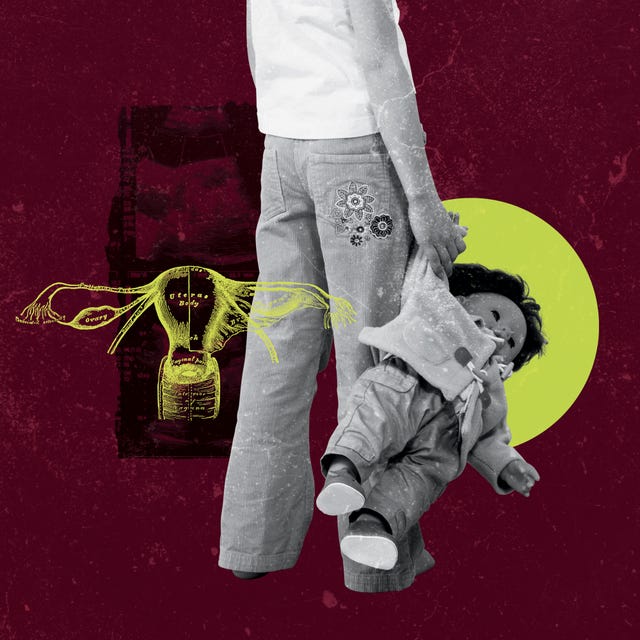Someday, you’ll meet a magical man and birth his children, who’ll carry on your legacy for generations to come. To me, this rhetoric has always sounded more like a nightmare than a fairy tale. Even as a kid, I had little interest in babies. When my parents would encourage me to play with dolls—“kiss your baby, Breanna!”—I’d toddle over to whatever one I’d left crumpled in the corner, give it a peck, and drop it again.
Not much changed as I became an adult. Despite the ubiquitous “girlboss” messaging that dominated my 20s, I never actually “wanted it all.” Being a mom felt like something that would monopolize my time and kill my dream of a leisurely life—and as a writer, I’ve always craved solitude. What I actually want is total freedom, and I lived in constant fear of it being taken away.
Until November 2023, when I opened up a copy of Women Without Kids by Ruby Warrington. The book introduced me to the idea of tubal removal, aka a salpingectomy, or having your fallopian tubes taken out entirely. I read about how it’s a minor, low-risk surgery that’s close to 100 percent effective at preventing pregnancy. Unlike with a hysterectomy, people who have their tubes removed still get their periods and aren’t forced into early menopause, and their hormonal balance doesn’t change. Plus—and this part’s not for me but still good to know—even with no tubes, you could still conceive through IVF later on if you changed your mind about having kids.
There are other benefits too, like a significantly reduced risk of ovarian cancer, especially compared with after a tubal ligation, or getting your tubes tied. (The latter also comes with a small but real risk of life-threatening ectopic pregnancies.) And the whole thing is generally free or low-cost, depending on your insurance plan, thanks to the Affordable Care Act. [Editor's note: It's unclear what president-elect Donald Trump's plans are for the ACA come January. But Project 2025, the ultra-conservative playbook written by members of his administration, suggests slashing it. If this procedure, or any other long-term birth control solution for that matter, is of interest to you, talk to your doctor as soon as you can.]
The choice, for me, felt simple—and I was frustrated as hell that I had to accidentally discover this option in a book, like it was on some sort of secret birth control menu. If only I’d known earlier, I thought, I could have avoided years of anxiety, of worrying that one accidental slip-up during sex could ruin my child-free happily ever after.
I also could have avoided years of trying to figure out more traditional birth control. On the pill, I suffered through intense mood swings, including deep sadness, as well as serious acne. An IUD didn’t seem like a good choice either, as some types can cause similar side effects. Tubal removal was the solution my body, lifestyle, and career had been craving.
My friends and family were nervous for me and warned it’d be hard to find doctors willing to remove a young, child-free woman’s tubes. The medical community’s implied sexism annoyed me, and the level of concern was intimidating—plus, as any woman in America knows, securing personalized reproductive health care often requires endless self-advocacy and jumping through logistical hoops.
Still, I knew I had to try—and in February 2024, right before my annual exam, I asked my gynecologist’s nurse about tubal removal. “It’s hard to talk them into something like that,” she scoffed. “Good luck.” The doctor had barely stepped into the room when I started tearfully pleading my case: “I want my tubes removed. I’ve done the research and I’m positive. Will you do it?” I expected a quasi-interrogation, with questions about my relationship status and the directive to think on it and come back in a couple of weeks. But after a pause that felt like it took years, she replied, “We have someone who does it here. Grab her card.” I gripped that contact info like it was a golden ticket.
About a week later, I found myself on a video consultation with the surgeon my doctor had referred me to. I’d spent 45 minutes beforehand gearing up for what I assumed would be a hard conversation. But...that part never came. She confirmed that removing—rather than tying—my tubes would be safer and more effective at preventing pregnancy. The call ended after just 15 minutes. My procedure was slated for May.
I called my mom, ecstatic about my pending new life. “She didn’t even ask if I was sure,” my voice cracked. “She trusts I know what’s best for my life and body, without anyone else’s approval.” What a freakin’ concept.
On the day of my surgery, after it was all over, I remember waking up in the recovery room. The whole thing had lasted just an hour. My tubes were gone. I was groggy, but my thoughts were clear: It’s over. I’m so glad I did this. What’s for lunch? I felt a sense of control I’d never had before.
Underneath the relief, though, there was another emotion, one I hadn’t anticipated feeling: anger. The fact that I could have achieved this peace of mind so much earlier? It made my blood boil. Throughout my two weeks of recovery, I only grew madder—for myself, yes, but also for all the people out there who have no idea that tubal removal, as a safe, effective kind of birth control, was even an option.
For women, the shameful truth is that when it comes to our health—and especially our reproductive health—sometimes word of mouth is all we have. Before my surgery, it was incredibly difficult for me to find comprehensive, accurate information on tubal removal. What was involved, what it felt like, what I would feel like after. Danielle Kolman, a content creator on Instagram who had the procedure, became a pivotal resource, and Reddit showed me countless other women’s experiences.
Finding a provider can be that much harder (even Planned Parenthood only offers tube tying). I was lucky to have my doctors. If they’d been different or if I were in a different socioeconomic position or even lived in a different state, things might not have gone so smoothly for me. And if I hadn’t picked up that book in the first place, I wouldn’t have been able to choose something I never knew existed.
So now I’m on a new mission—to tell my story, to shout that tubal removal is an option that could change someone else’s life for the better too. This is the legacy I want for myself—not carrying on bloodlines but inspiring other women to realize they have more choices than they may have expected.
As I run my hand over my lower belly and forever empty uterus, I’m beyond grateful to have locked in the life I’d always dreamed of. I hope many others will soon be able to say the same.
Breanna Mona is a writer-editor with bylines in Healthline, Forbes Health, People, Today.com, and more. She writes about women’s health, lifestyle, and entertainment and is working on her first book.














